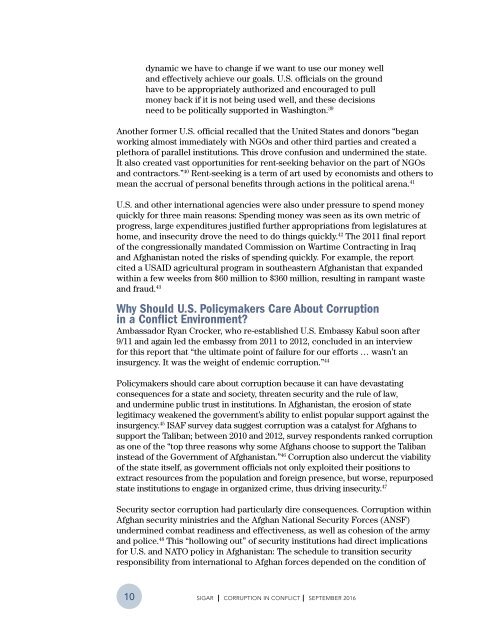CORRUPTION IN CONFLICT
5IlaWjQej
5IlaWjQej
Create successful ePaper yourself
Turn your PDF publications into a flip-book with our unique Google optimized e-Paper software.
dynamic we have to change if we want to use our money well<br />
and effectively achieve our goals. U.S. officials on the ground<br />
have to be appropriately authorized and encouraged to pull<br />
money back if it is not being used well, and these decisions<br />
need to be politically supported in Washington. 39<br />
Another former U.S. official recalled that the United States and donors “began<br />
working almost immediately with NGOs and other third parties and created a<br />
plethora of parallel institutions. This drove confusion and undermined the state.<br />
It also created vast opportunities for rent-seeking behavior on the part of NGOs<br />
and contractors.” 40 Rent-seeking is a term of art used by economists and others to<br />
mean the accrual of personal benefits through actions in the political arena. 41<br />
U.S. and other international agencies were also under pressure to spend money<br />
quickly for three main reasons: Spending money was seen as its own metric of<br />
progress, large expenditures justified further appropriations from legislatures at<br />
home, and insecurity drove the need to do things quickly. 42 The 2011 final report<br />
of the congressionally mandated Commission on Wartime Contracting in Iraq<br />
and Afghanistan noted the risks of spending quickly. For example, the report<br />
cited a USAID agricultural program in southeastern Afghanistan that expanded<br />
within a few weeks from $60 million to $360 million, resulting in rampant waste<br />
and fraud. 43<br />
Why Should U.S. Policymakers Care About Corruption<br />
in a Conflict Environment?<br />
Ambassador Ryan Crocker, who re-established U.S. Embassy Kabul soon after<br />
9/11 and again led the embassy from 2011 to 2012, concluded in an interview<br />
for this report that “the ultimate point of failure for our efforts … wasn’t an<br />
insurgency. It was the weight of endemic corruption.” 44<br />
Policymakers should care about corruption because it can have devastating<br />
consequences for a state and society, threaten security and the rule of law,<br />
and undermine public trust in institutions. In Afghanistan, the erosion of state<br />
legitimacy weakened the government’s ability to enlist popular support against the<br />
insurgency. 45 ISAF survey data suggest corruption was a catalyst for Afghans to<br />
support the Taliban; between 2010 and 2012, survey respondents ranked corruption<br />
as one of the “top three reasons why some Afghans choose to support the Taliban<br />
instead of the Government of Afghanistan.” 46 Corruption also undercut the viability<br />
of the state itself, as government officials not only exploited their positions to<br />
extract resources from the population and foreign presence, but worse, repurposed<br />
state institutions to engage in organized crime, thus driving insecurity. 47<br />
Security sector corruption had particularly dire consequences. Corruption within<br />
Afghan security ministries and the Afghan National Security Forces (ANSF)<br />
undermined combat readiness and effectiveness, as well as cohesion of the army<br />
and police. 48 This “hollowing out” of security institutions had direct implications<br />
for U.S. and NATO policy in Afghanistan: The schedule to transition security<br />
responsibility from international to Afghan forces depended on the condition of<br />
10<br />
SIGAR I <strong>CORRUPTION</strong> <strong>IN</strong> <strong>CONFLICT</strong> I SEPTEMBER 2016


